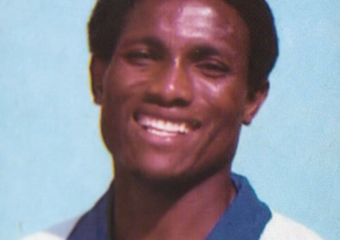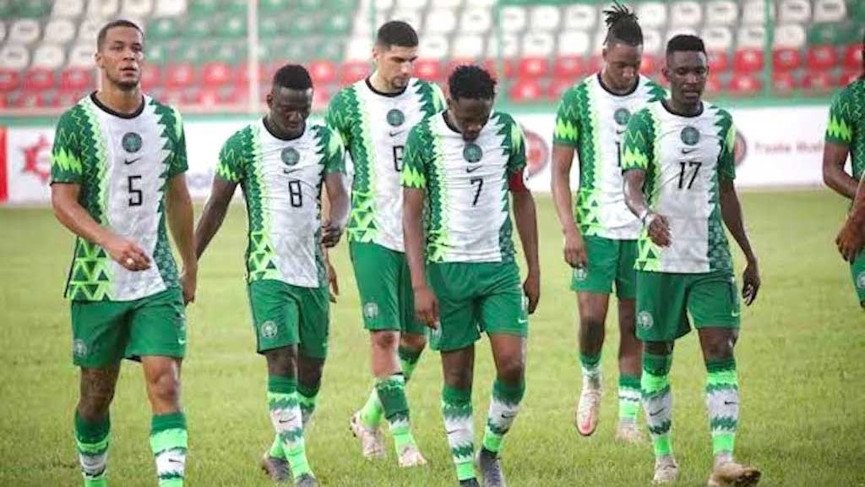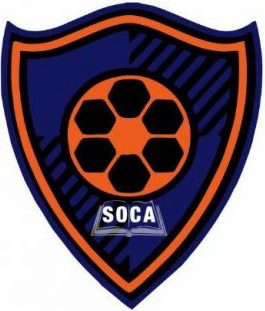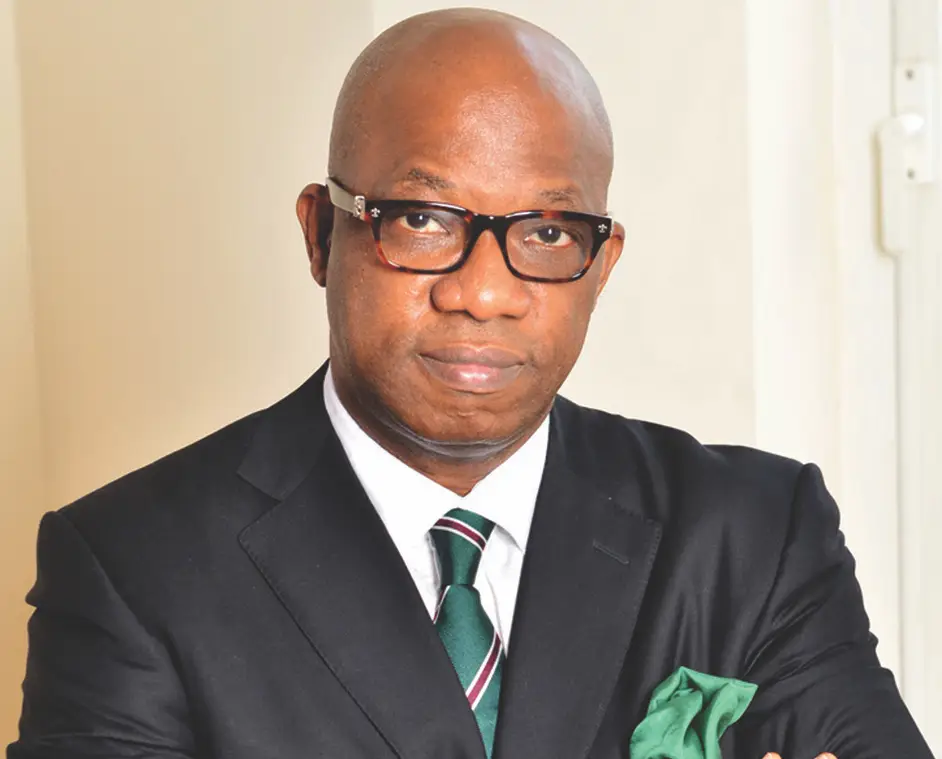The elements are at work again, playing games with the affairs of man.
This is an unlikely tale of two of Nigeria’s greatest football strikers .
Whenever my telephone rings at an ungodly hour, it bothers me, because, often it is a harbinger of sad news.
This past week I received two such telephone calls, one day apart, from two friends in the very early hours of each of the days. Both calls were spirit dampeners.
Godwin Efejukwu called me before 6 O’clock in the morning last Tuesday.
I picked up the call because it was Godwin. He is a retired police officer. He left the Police Force as a Chief Superintendent many years ago. We were, for a brief period, between 1977 and 1978, colleagues in the national football team of Nigeria. He was a goalkeeper and was invited from the Nigerian Police Machine FC, a team that regularly produced great football players in those days and was in the top echelon of Nigerian football. Because of the time of the call, I assumed already that it would be bad news. There is too much of it blowing in the air these days.
“Oyarekhua is dying, please you must do something to help him”.
He gave it to me upfront and bluntly, not mincing words and without any pretentious niceties.
Of course, I know Sunday Oyarekhua. I never played with him if my recollection is correct.
Nigerians know him as a mercurial Centre-Forward for the Police Machine FC and also for Green Eagles in the early 1970s. I had also recently read somewhere that he was bedridden as a result of Stroke and was living in pain at his home in Lagos.
Godwin’s message is painful: Sunny is now unable to walk or talk audibly, and is slowly being drained of life. He needs help.
Sunny Oyarekhua, as he was better known before and during the Second All-Africa Games in 1973, was at the top of the goalscoring chart when Nigeria won the Gold medal at the Games in Lagos. He was Nigeria’s most prolific goalscorer in the national team for the years that he was there. He had pace and power, always at the right spot at the right time in the box, pouncing on loose balls and ’burying’ them behind opposing goalkeepers. He was so consistent that many football fans described him as a goal-scoring machine. He had the nose for ‘smelling’ and scoring goals. By the time he was done with the national team in 1976, he had amassed a goal-chest of 17 goals in 28 international matches for Nigeria, the highest by any player at national team level up to that point.
Unfortunately, by the time the national team returned from Dire Dawa, Ethiopia, in 1976, venue of the African Cup of Nations, where Nigeria won her first Bronze medal in AFCON, Nigeria had identified a fresh pair of legs to strike for the national team. That trip marked the end of Sunny’s career and reign as the Green Eagles’ hit man. That young man, was Thompson Usiyan.
But back to Sunny for a moment. Unlike most retiring athletes that suffer and languish in despair, neglect and penury after their sports careers are over, Sunny Oyarekhua returned to his primary constituency, the Police Force after retirement. For the next 3 decades, or so, he served the Force with dignity and honor, just as he served Nigerian football with distinction.
A couple of years ago, by the time he finally retired from the service of the police, he rose to the position of Assistant Commissioner of Police. This is a position from which he should NOT now be counted amongst former athletes neglected and languishing in their aging years. Apparently, for whatever reason, he is, hence Godwin’s call, as well as social media reports calling for help for him.
My response to Godwin is that we must first know exactly what Sunny needs to alleviate his situation, and then we can jointly raise the issue with appropriate authorities that can help, including the Nigerian Police and the Nigerian sports and football authorities.
I was still trying to digest Sunny Oyarekhua’s situation when another call came the following morning.
Again, the time was ungodly – before dawn. This time it was from my friend and fellow Green Eagle member, ’Franco Nero’, Francis Moniedafe, from his base in Raleigh, North Carolina, USA.
Francis calls me at all hours, so I had no apprehension when I picked up his call.
He broke the sad news to me – Thompson Usiyan was on his death bed. Thompson’s wife had just called him a few minutes before calling me that her husband who had been receiving treatment for Colon Cancer in a hospital in California, and had been receiving treatment in the Intensive Care Unit of the hospital, had been discharged. His case was terminal and there was nothing more the hospital could do. So, he was to be taken home to spend his final hours, or days, as the case may be, with his family.
That was shattering!
Francis was calling me to tell me to get Nigerians to pray for Thompson as nothing more could be done for him.
It was very frustrating to realize the fragility of life and the futility in struggling to live ‘forever’ when ‘it’ will inevitably come when ‘it’ will come.
Two hours later, another journalist called asking if I had heard the news of Usiyan’s death.
Then the calls started to rain.
Thompson Usiyan had died in his home with his family around him!
That really hit me hard.
For once, I realize how completely helpless we all are against the Elements.
This catastrophic event is a recurring decimal in and of life; that death will come to everyone, one by one, turn by turn.
I am thinking of Thompson and seeing the connection with Oyarekhua. Uncanny.
I remember my years with Thompson as if they were yesterday.
In 1976, I made my second appearance in the Green Eagles squad. I had been invited to the squad in December of 1973 as a result of my performance during the first National Sports Festival, in Lagos. I left the team in 1974 to return to my studies and to club football only in Ibadan for the next 2 years.
In 1975, during the Second National Sports Festival, Thompson Usiyan appeared flittingly like a meteor on the scene as a member of the Academicals team of Mid-West/Bendel State. He played only one match, the final match against a star-studded Western Academicals team that had Tunde Balogun, Taiwo Ogunjobi, Zion Ogunfeyimi, Christopher Okolo, and so on. Thompson came in as a sub, tall and gangly, and with only a few touches on the ball, a clever goal scored with his head, and some intelligent movements and dribbles, he had won the hearts of the full-house of spectators as well as the national team handlers scouting for young talents.
With one match, Thompson moved into the National squad of Nigeria.
He was the player the coaches had been looking for, a player with the ‘nose’ for goal scoring, who would succeed the aging Policeman, Sunny Oyarekhua, Nigeria’s highest goalscorer at national team level up to that time. That’s the uncanny connection between the two strikers, because 36 years after that period, the two names have surfaced together again, in the past one week, on the plate of Nigerian football.
Thompson joined the national team immediately after the festival, travelled with the team to East Africa on their way to the 1976 African Cup of Nations in Ethiopia, had his debut during that tour against Kenya on February 7, in Nairobi, scored his first goal in that match, and never looked back again until he migrated to the USA on the eve of Nigeria’s last World Cup qualifying matches against Tunisia in 1977. In less than two short years, he became one of the greatest strikers in Nigerian football history.
Thompson played in all the matches in Ethiopia except against Guinea, scored three goals in all and, by the time the team returned to Nigeria, had permanently ‘retired’ Sunny Oyarekhua from the Green Eagles. So, Oyarekhua indirectly handed the baton to Usiyan.
After that, Thompson led Nigeria’s attack to defeat the strongest team in Africa at the time, Morocco, and qualified for the 1976 Olympic Games of Montreal, Canada.
It was after all these in June of 1976 that I returned finally and fully to the national team having graduated from school, and was doing my National Youth Service with the Green Eagles. There could never have been a happier and luckier Youth Corper than I in Nigeria’s history.
When I played my first official match for Nigeria against Sierra Leone in Freetown in 1976 I played on the right side of the attack mainly because Thompson Usiyan was now fully established as Nigeria’s number 1 hitman.
Thereafter, the young man who rose from the national Academicals, started to mesmerise the whole country with his goalscoring skills and ability. Although Sunday Oyarekhua was also in the same 1976 national team squad, and played some of the matches in Ethiopia, it was as a substitute to Thompson.
With Thompson’s rise, Sunny Oyarekhua packed his bags from the national team for the last time. By the time I came and joined Thompson and Kunle Awesu, the best left-sided winger in Africa from Dire Dawa, Oyarekhua had become history in the national team.
Thompson left Nigeria hurriedly in 1977. He abandoned an uncertain career in football in Nigeria for the assured greener pastures of America, following in the footsteps of the pioneers of that cross-Atlantic movement – Andrew Atuegbu, Tony Igwe, Dominic Ezeani, Sunny Izebigie, Taiwo Ogunjobi, Tunde Balogun, Yomi Bamiro, and many others.
Thompson was part of the second wave of mass-migrants that included Adekunle Awesu, Ben Popoola, Muyiwa Sanya, Ogidi Ibeabuchi, Ken Ilodigwe, and so on.
After him, there was a third wave of Francis Moniedafe, Chris Ogwu, Damian Ogunsuyi, Sam Okpodu, Alfred Keyede, Ken Boardman, Segun Adeleke, Emmanuel Merenini, and a whole army of some of the best young and established talents in the country.
In the fourth wave were the Olukanni brothers, Tajudeen Disu, Arthur Egbunam, Paul Okoku, Humphrey Edobor, Nathaniel Ogedengbe, and so on.
Thompson’s departure on the eve of Nigeria’s final qualifying matches with Tunisia became a disaster for the country. The man had set such a high standard in goalscoring that for almost one decade after his exit there was not a good-enough replacement until Rashidi Yekini came from Kaduna to the Shooting Stars FC, fell into the embrace of Chief Festus Onigbinde, and became the hitman of the national team from 1984!
Thompson was that good and that influential.
Thompson returned briefly in fits in 1978 and joined us at the All African Games in Algeria, but America had blunted his goal-scoring edge. He was not quite the same player any more.
But then, he had set alight USA Collegiate football. He became the most decorated African player in USA College football history. To date, no African player has matched Thompson Usiyan’s goalscoring records in American Collegiate football.
That’s why it was easy for him to get a professional contract in the USA and Canada when professional football was just struggling to take off in that part of the world. He was given American citizenship, and was even hired to be a part of the USA technical contingent to Nigeria ’99.
Of the 1976 to 1978 members of the national team too many have passed on, each with their own painful story – Joseph Erico, Kelechi Emetiole, Ogidi Ibeabuchi, Alloysius Atuegbu, Adekunle Awesu, Mudashiru Lawal, Kenneth Olayombo, Samuel Ojebode, Haruna Ilerika…….and so on.
Thompson’s death is an addition, a reminder of our mortality, that life, really, is a route to death, containing all the basic ingredients of how, where and when the inevitable will happen.
In my humble estimation, Thompson was the most gifted striker in the history of Nigerian football. He was extravagantly skillful (like Jay Jay Okocha, but more lethal), an excellent dribbler, and deceptively quick off the mark with very sharp reflexes. His greatest weapon was his ability to shoot or bend the ball from a standing position. Inside the box, with the ball at his feet, and from a ‘harmless’ standing position, surrounded by defenders, he could strike the ball with either of his feet, or bend it, with precision and power. He was an excellent header of the ball. He inspired me to learn how to head better than I did, and between us in the national team for a brief period, we were more than a handful for most opposing teams.
On the road to Montreal, Canada, during our tour of Europe, the Eagles were called the 3-5-10 Eagles, the numbers reflecting the number of goals Thompson and his striking partners handed out to the small club-sides we played against, as no European country would agree to play against an African national team at the time. They considered our standards too low.
The movement to America was ‘redemption call’ for Thompson, and for many Nigerian players that grabbed the opportunities of higher education that were offered at the time. Their action depleted the pool of exceptional talent in the Nigerian football firmament.
Thompson was a real ‘Warri boy’, streetwise, clever and with an infectious laughter that endeared him to everyone. His greatest ‘friend’ and ‘foe’ at the same time was ‘Babuje’, Emmanuel Okala.
Between them there was a daily duel of words outside the field and of a fierce competition inside it.
Thompson loved to score against Okala. He loved to see the ‘pain’ in Okala’s eyes, and would jokingly mock him, every time he managed to put the ball behind the ‘Man Mountain’. Oh, how Okala ‘hated’ those moments. It was as if only Thompson had his number time and time again during training sessions. Most of us, forwards, were terrified to go near Okala when he was between the posts. Not so, Thompson.
During shooting practice sessions, Okala’s pleasure was humbling forwards. He succeeded against all except Thompson. So, it was a daily ‘war’ of friendly boasting and betting between them.
Nigeria would have, almost undoubtedly, gone to the 1978 World Cup in Argentina had Thompson not left the national team at the time he did for the USA with only the last two crucial matches to play with Tunisia. That team would have been the first Nigerian National Team to go to the World Cup, and with the abundance of exceptionally talented and expressive footballers in the team, would have made a great impression around the world of football. Thompson was the missing link in 1977.
His death is painful.
His sojourn in Nigerian football was short, very short – 2 years! Yet, those that saw him play will never forget his mesmerizing moves, his exceptional talent and, particularly, his goals.
As he transits to a higher realm, I pray that he travels peacefully to meet his Creator.
On behalf of all generations of Nigerian footballers, I express our sincere collective condolences to the family of Thompson ‘Tommy Tay’ Usiyan as he ‘rests’ . Goodnight, my friend.
Meanwhile, we must not forget the living, the man Thompson displaced in the national team in 1976, the police Officer and Gentleman, Sunny Oyarekhua, as he lies on his sick bed in need of our attention and support to elongate and make his years here on earth happier and more comfortable.









The submission on Thompson Usiyan and Sunny Oyerekuah is comprehensive.. very detailed.
Couldn’t have come from just any other source. This is the Mathematical Odegbami. Thank you sir.
I completely agree that we just threw away the clear chance of qualifying for our first World cup appearance in 1977.. The world missed that team in Argentina 78. It was a solid team. Of Course operating on the right flank was Segun Odegbami